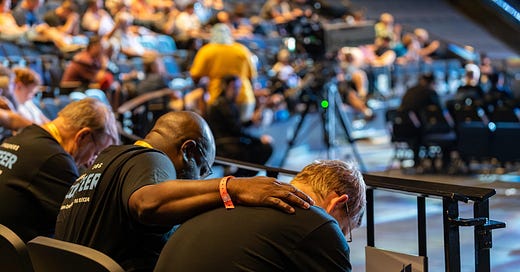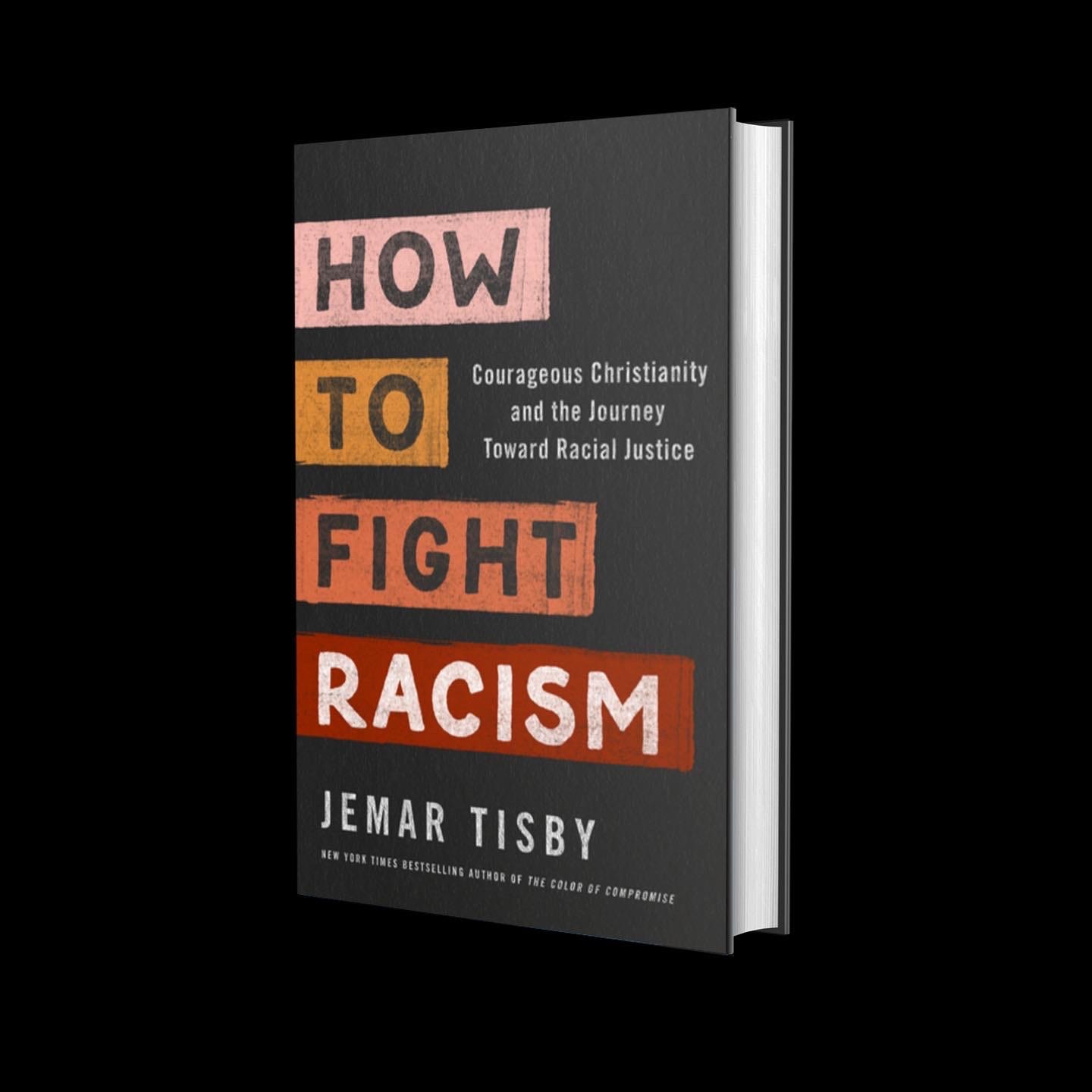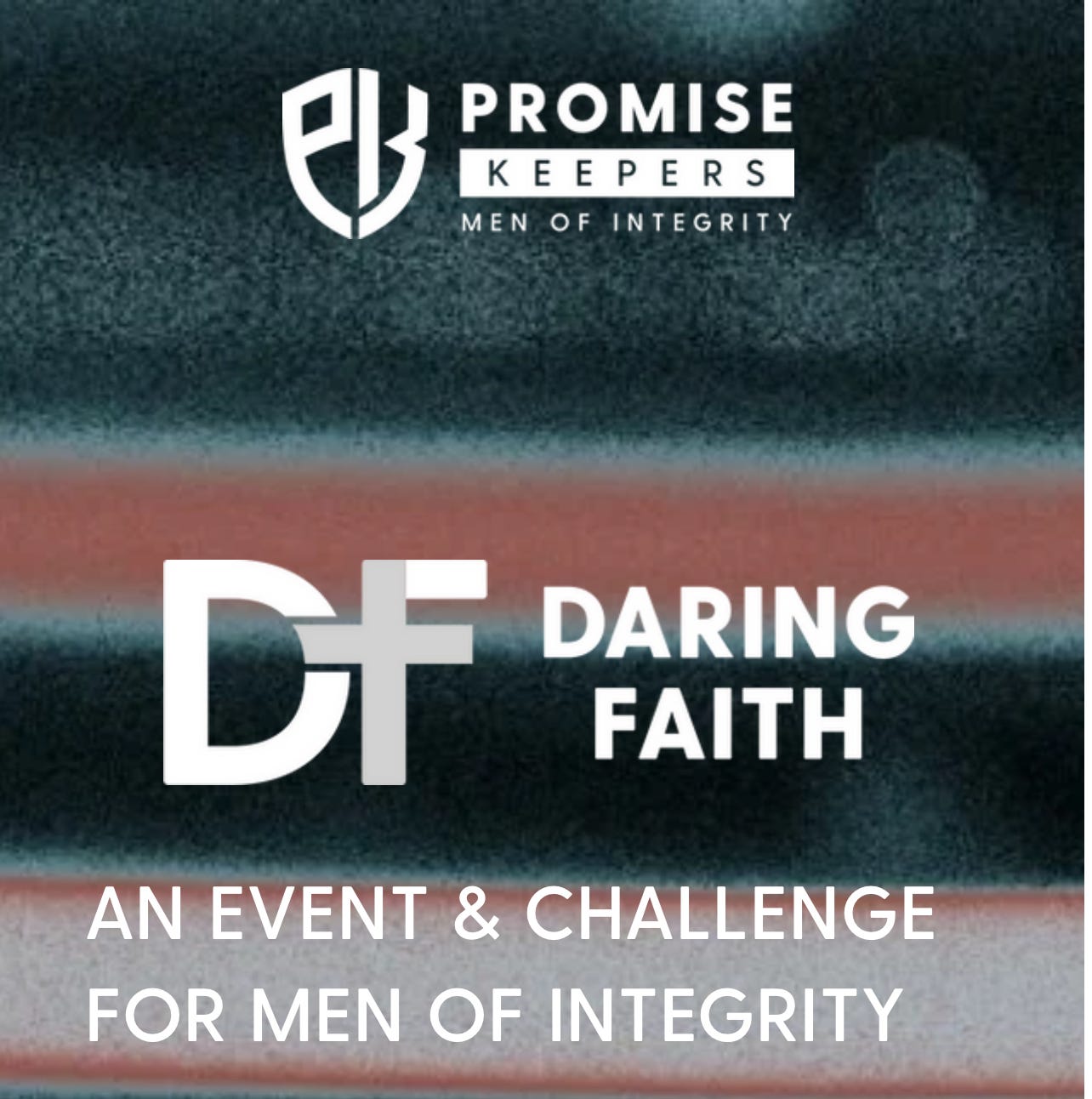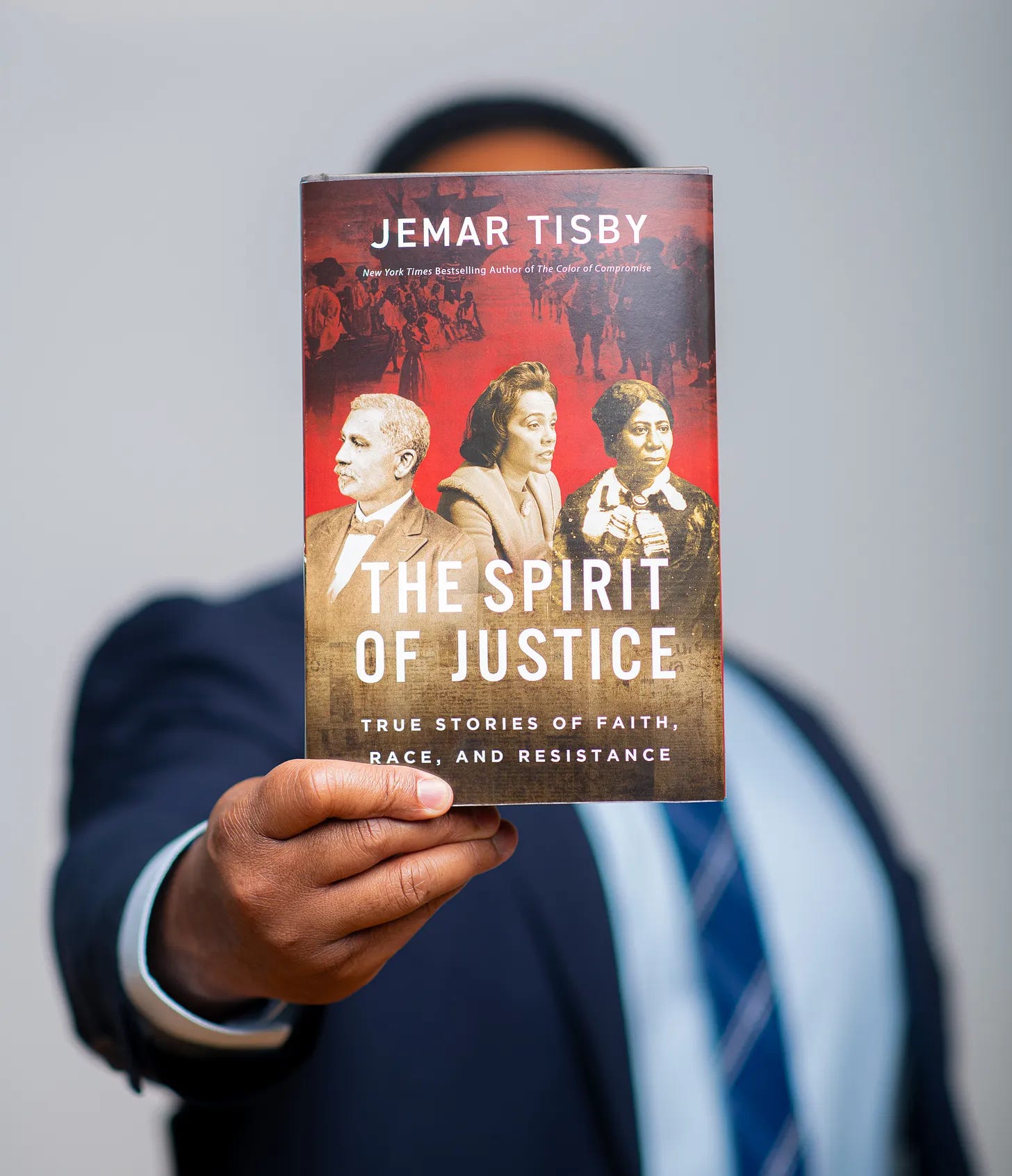Can a Right-Wing Promise Keepers Keep Its Promise of Racial Reconciliation?
The MAGA-infused revival probably can’t, but here are some ideas for how it can.
If you’ve been reading my Substack for a while, but you haven’t committed to becoming a paid subscriber, consider this your encouragement. If you don’t do it today, when will you?
The Promise Keepers organization is staging a comeback, this time on the far-right of the political spectrum.
But their latest iteration is sure to break their promise of bridging racial divides.
I wrote about the Promise Keepers, and specifically their focus on racial reconciliation, in my second book, How to Fight Racism.
Here’s a bit of what I said.
In 1996 the Promise Keepers movement, a ministry to Christian men that holds annual rallies for tens of thousands of people, chose racial reconciliation for its theme. They titled the rally “Break Down the Walls” based on Ephesians 2:14: “For he himself is our peace, who has made the two groups one and has destroyed the barrier, the dividing wall of hostility.”
At one point in the conference, held at the Georgia Dome, the leader invited the pastors of color to come down to the floor of the arena. They encouraged other pastors to hug them on the way. “We hugged, patted and cheered for 45 minutes. It was wonderfully warm—warmed up the whole conference. There was a lot of crying,” said one white pastor in attendance.
At the end, many of the pastors who attended signed the “Atlanta Covenant,” which had seven principles, one of which required, “Reaching beyond any racial and denominational barriers.”
Founded in the 1990s and known for huge stadium events, the movement saw its attendance and popularity wane over time.
Now the Promise Keepers have hosted their first event since 2021.
It took place in Tulsa, Oklahoma on the campus of the conservative Christian school Oral Roberts University. The leaders selected the theme, “Daring Faith”.
The event featured a long list of right-wing speakers such as Charlie Kirk of Turning Point USA, Jim Caviezel who played Jesus in The Passion of the Christ film, and Republican politicians Governor Kevin Stitt and Senator James Lankford.
To paraphrase a line from the TV show The Mandalorian—“This is NOT the way.”
Platforming far-right speakers does nothing to advance the Promise Keepers’ stated commitment to racial reconciliation.
The speakers at a conference shape the content.
Can we really imagine that this Promise Keepers event conveyed powerful truths about racial justice, equity, systemic racism, and the like?
Probably not.
Instead, they platformed speakers like Charlie Kirk who recently cast aspersions on airline pilots because of their skin color.
He said, “I’m sorry, if I see a Black pilot, I’m going to be like, ‘Boy, I hope he’s qualified,’”
Are you really sorry, Charlie?
Probably not.
And both politicians they got—Gov. Stitt and Sen. Lankford—have added to the pile-on of misinformation and fear-mongering around Critical Race Theory.
It’s a theory, typically taught in law school, to help explain how racism can get embedded into the legal system. But for right-wing politicians, CRT has become a boogeyman that stokes resistance to education about racism.
But the Promise Keepers new leader, Shane Winnings—Army veteran and former law enforcement officer—is no fool.
He and his team recruited a racially and ethnically diverse roster of other speakers and worship leaders.
That makes it a bit trickier to accuse them of racism.
Far too often, however, people who deny the ongoing effects of racism will enlist people of color to their cause—and entice them with hefty honoraria and massive exposure—to deflect accusations of racism.
It’s an old and frustratingly effective, tactic.
I’ve never met Mr. Winnings. Perhaps he is truly and genuinely committed to his version of racial reconciliation.
So be it.
But let me offer an alternative route.
Here’s what the Promise Keepers could do if they were serious about racial reconciliation.
It follows the framework I laid out in How to Fight Racism called the ARC of Racial Justice™.
ARC is an acronym that stands for Awareness - Relationships - Commitment.
I should charge Promise Keepers thousands of dollars in consulting fees for what I’m about to share, but I offer it here for free in the hopes someone will learn from it and use it.
Here’s multi-faceted plan for Promise Keepers to fulfill its promise for racial reconciliation:
Awareness
Gain the data, knowledge, and information necessary to comprehend the racial issues of today and the history that led to it.
To do this leaders of Promise Keepers should conduct a listening tour.
Head to the hubs of Promise Keepers constituencies. Gather small interracial groups of men (since this movement is focused on men), and listen without judgement to their thoughts on race and how the church can be part of the solution.
Use that information to craft a tailored plan that puts your followers first
In addition, leaders can do book study groups and screenings of movies and documentaries. They can hold discussions amongst each other and, in so doing, develop a shared language and understanding about race and racism.
Relationships
One critical flaw of most predominantly white Christian organizations is the impulse to create new programs and initiatives, and then invite Black people to participate rather than supporting Black-led projects.
What if, instead of inviting Black people and other people of color to *their* events, Promise Keepers came alongside the programs that people of color have created themselves.
Promise Keepers could use the funds they’ve budgeted for their own events and donate them to people of color-led events.
They could come alongside as a sponsor or anonymous donor.
This requires immense organizational humility, but it would also build massive credibility for their racial reconciliation efforts.
Organizations such as Promise Keepers must practice solidarity with Black and other PoC organizations to foster meaningful relationships on the road of racial reconciliation.
Commitment
Commitment means more than simply “staying the course.” It means committing oneself and one’s organization to systemic and institutional remedies to racism.
The Promise Keepers should begin by addressing policy issues within their own organization.
Who is responsible for setting goals, developing strategy, and ensuring the institution makes progress on its commitment to racial unity?
If Promise Keepers does not have a standing, and empowered, racial justice committee, they should form one. This group would be charged with composing a plan for racial reconciliation and operationalizing it.
White Christians typically make little mention of systemic and institutional issues in their approaches to racial reconciliation.
To demonstrate their commitment to racial reconciliation, Promise Keepers should adopt a slate of policy recommendations to combat racism on a collective and communal scale, not just an individual one.
It could include criminal legal system reforms, support for reparations initiatives, and a dedication to equitable healthcare and education.
But this resolve to address racism at the systemic level is exceedingly difficult for white Christians.
In their seminal book, Divided by Faith, Michael Emerson and Christian Smith explain white evangelical recalcitrance this way,
[White evangelical solutions to racial priblems] are profoundly individualistic and interpersonal: become a Christian, love your individual neighbors, establish a cross-race friendship, give individuals the right to pursue jobs and individual justice without discrimination by other individuals, and ask forgiveness of individuals one has wronged.
White Christians typically make little mention of systemic and institutional issues in their approaches to racial reconciliation.
Promise Keepers will likely be no different.
You Can Take Action
I’d be gratefully shocked if Shane Winnings or any of his leadership team viewed my studied and practical recommendations as anything more than Leftist drivel.
I’d gladly talk to Shane and share more.
I suspect—with grief and somberness—that the Promise Keepers leadership will lean even further to the political and ideological right.
It is a financially lucrative position and guarantees a sizable and faithful, if misguided, following.
The enticements to right-wing ideology are typically too strong for people to resist.
Even if these suggestions for the Promise Keepers organization go unheeded, unheard, or even mocked, you can still take action.
Examine your churches and organizations. How might you utilize the ARC of Racial Justice to lead to more equity and diversity?
Perhaps Promise Keepers will be an inspiration. Perhaps it will be a cautionary tale.
You can’t control what they do, but you can certainly exercise agency over what you do to promote racial justice.
What else would you say to the Promise Keepers leadership about fulfilling their promise of racial unity? Comment below.
Learn about the people of faith who succeeded in racial justice where Promise Keepers will likely fail. Order your copy of my next book “The Spirit of Justice” today!







I was at the 1996 PK event at the LA Coliseum, covering it for the NYT Syndicate. We should compare notes sometime!
As is the usual case, racism is viewed as personal, not systemic. Black men within these scenarios or more utilities for their objectives. Best to stay away from PK org and go with authentic relationships with White brothers and others.
I remember being one of a relatively few number of African Americans present at a Promise Keepers event, where the emphasis was racial reconciliation. The white guys were told that they needed to apologize to the black guys as representative of historic sins and mistreatment. While they got the historical part right, the solution was wrongheaded. A bunch of white guys in my section of a football stadium, whom I did not know, descended on me because I was black to offer their apologies, to ask my forgiveness and to get a “redemptive” hug. Of course I complied, even against my sense of reason and decorum. If I had refused, that would have put them (and myself!) in an awkward situation. So I became the object of their catharsis. In that moment, I did not want to be there. I did not need to be there. I was not interested in being the “BLACK GUY” who assuaged the guilt or filled the needs of white folk. (This same principle would apply regardless of race and ethnicity). I don't want my race to be a reason for my presence or utility. This was not the first occasion of an experience such as this. Many black folks are very familiar with this scenario.
This end of the spectrum can be described as, "I-need-you-because-you-are-black.”